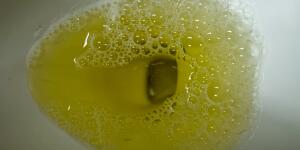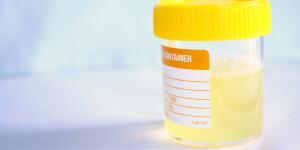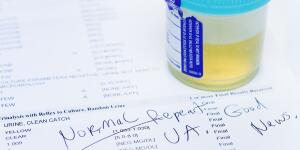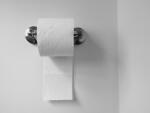-
Urine is the liquid waste the kidneys produce. It’s the result of your kidneys filtering your blood and removing extra water and various waste substances. After the kidneys make it, urine travels through ureters to the bladder where it stays until you’re ready to urinate. You may not give it much thought, but there’s a lot to know about this bodily fluid. Here are five urine facts you should know.
-
1You make about 3 to 8 cups of urine each day.

Healthy adult kidneys filter all the blood in the body about once every 45 minutes. During a typical day, this makes around 3 to 8 cups of urine. Several things can influence how much urine you make and how frequently you urinate including:
- Amount of fluid you drink
- How much fluid you lose through sweat and breathing
- Quantity and type of food you consume
- Your medical conditions and medications
Overly frequent urine urges can also be a sign of a problem, such as a UTI (urinary tract infection) or diabetes.
-
2Urine is normally a pale-yellow color.

The yellow color of urine comes from a substance called urochrome. Urine is usually a pale yellow, but it may deepen sometimes, such as first thing in the morning. Very dark yellow can be a warning sign of dehydration. Other things that can discolor urine include:
- Foods, such as beets and rhubarb, and food dyes
- High-dose vitamins, such as B-complex vitamins, especially if you are taking more vitamin that your body need
- Medical conditions, such as liver disease, UTIs, urinary tract stones, or kidney problems
- Medications, such as phenazopyridine (Pyridium) and certain antibiotics, laxatives, and cancer chemotherapy drugs
See your doctor for unexplained changes in urine color or for bloody urine.
-
3Urine usually has a mild ammonia smell or no smell at all.

Urine contains a small amount of ammonia, so it typically has a slight odor to it. Drinking lots of fluids tends to dilute this smell. Urine smells stronger when it is concentrated because the amount of ammonia is higher. This normally happens after periods of not drinking, such as when you wake up after sleeping. Like urine color, certain factors can change urine odor including:
- Foods and beverages, such as asparagus or coffee
- Medical conditions, such as UTIs, diabetes, and certain metabolic disorders
- Medications, such as antibiotics, and some vitamins
See your doctor if urine odor persists or accompanies other concerning symptoms.
-
-
4Urine is mostly water and should be sterile.

Urine is about 95% water and normally contains no microorganisms, making it sterile. Believe it or not, this makes it useful as a survival tool if you have no other sources of safe drinking water. The thought is somewhat repugnant, but it could save your life in this scenario. However, the kidneys will make less and less urine as dehydration progresses and the urine will contain less and less water. So, this only works in the very short term.
What about so-called urine therapy? Advocates argue beneficial substances, such as vitamins, remain in urine. While this is true, urine also contains waste products, including drug and chemical residues. Your kidneys have reabsorbed everything else your body needs. The bottom line—drinking small amounts of urine is probably harmless, but excessive consumption is not recommended.
-
5Urine can tell your doctor a lot about your health.

A urinalysis is often part of routine health checks. Doctors use this lab test because urine can hold several clues about your overall health. Urine tests can detect hormones, drugs, blood cells, protein, glucose, bacteria, and natural breakdown products. There are three components to the test—visual, chemical and microscopic examinations. The results can tell your doctor about several medical conditions including:
Because of this useful information, doctors often order urine tests to screen, diagnose and monitor these medical conditions and their treatments.























